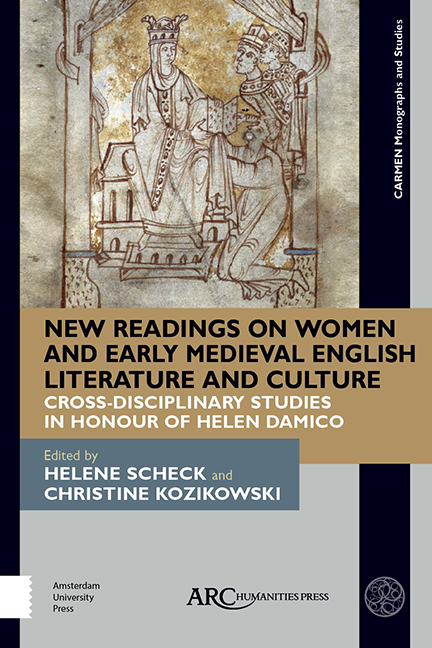 New Readings on Women and Early Medieval English Literature and Culture
New Readings on Women and Early Medieval English Literature and Culture Book contents
- Frontmatter
- Contents
- List of Illustrations
- List of Abbreviations
- Note from the Editors
- Introduction: Feminism and Early English Studies Now
- PART ONE LITERACY AND MATERIAL CULTURE
- PART TWO ENGENDERING MARRIAGE AND FAMILY
- PART THREE WOMEN OF THE BEOWULF MANUSCRIPT
- PART FOUR WOMEN AND ANGLO-SAXON STUDIES
- Select Bibliography
- Index of Manuscripts
- General Index
7 - Saintly Mothers and Mothers of Saints
Published online by Cambridge University Press: 20 November 2020
- Frontmatter
- Contents
- List of Illustrations
- List of Abbreviations
- Note from the Editors
- Introduction: Feminism and Early English Studies Now
- PART ONE LITERACY AND MATERIAL CULTURE
- PART TWO ENGENDERING MARRIAGE AND FAMILY
- PART THREE WOMEN OF THE BEOWULF MANUSCRIPT
- PART FOUR WOMEN AND ANGLO-SAXON STUDIES
- Select Bibliography
- Index of Manuscripts
- General Index
Summary
WHEN AUGUSTINE AND his companions landed in Kent in 597, ready to embark on the conversion of the English, their initial contact was with the local ruler, King Æthelberht. At first he ordered them to remain on the Isle of Thanet, but not long afterwards he granted them land in Canterbury, the capital of his kingdom, and allowed them to preach the new faith. His own conversion followed soon after, and from then onwards the mission began to flourish. Although there was no coercion by the ruler, this was a process of conversion sponsored by the king's social leadership; it was thus one of acceptance, not of confrontation— at least as narrated by Bede, whatever might have been the reality at a more individual level. The first attempt at the conversion of Northumbria was likewise royally sponsored when Paulinus accompanied Æthelburg, daughter of Æthelberht, on her journey to Northumbria to marry King Edwin, then pagan, but baptized in 627. It is clear that, once again, the mission enjoyed royal support, as it was to do more emphatically when Oswald took power in 634 and almost immediately invited the monastery of Iona to send someone who would be able to bring his people to the faith to which he had been converted in exile. The resulting mission, led by St. Aidan, was generously supported by the king in many practical ways: by the grant of Lindisfarne as the monastic centre of the mission— appropriately isolated in being cut off by the tides twice a day, but yet within sight and reach of the king's power-centre at Bamburgh; by generous alms; and, in the early stages, by the king acting as Aidan's interpreter. We know far less about Birinus's mission from Rome to Wessex at around the same time (ca. 634), but again the conversion of King Cynegils was evidently a key factor: King Oswald was present, stood sponsor at his baptism, and the two kings together granted Birinus the old Roman city of Dorchester-on-Thames as the place where he could establish his episcopal see.
This simple sketch of the nature of the Anglo-Saxon conversion as told by Bede may seem to be rather tangential to a study of saintly mothers and mothers of saints.
- Type
- Chapter
- Information
- New Readings on Women and Early Medieval English Literature and CultureCross-Disciplinary Studies in Honour of Helen Damico, pp. 131 - 140Publisher: Amsterdam University PressPrint publication year: 2019


